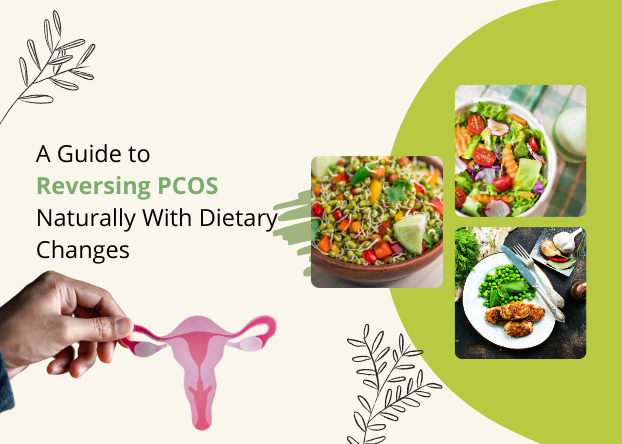A Guide to Reversing PCOS Naturally With Dietary Changes

Polycystic Ovary Syndrome (PCOS) is a common hormonal disorder affecting millions of women across the globe. Despite its prevalence, PCOS often goes undiagnosed for years, leaving women to grapple with debilitating symptoms and long-term health risks. This condition is a leading cause of infertility as well.
Traditionally, many women with PCOS are prescribed birth control as a one-size-fits-all solution. However, this approach often fails to address the root of the problem and can even exacerbate symptoms.
The truth is, PCOS is a complex condition, but it can be managed effectively through a holistic approach. Many women have successfully reduced their PCOS symptoms and even achieved remission by focusing on nutrition, supplements, and lifestyle modifications.
At Diet for Wellness, we’ve also helped countless women overcome the challenges of PCOS by providing personalized guidance and support.
Symptoms of PCOS
PCOS is characterized by hormonal imbalances, particularly an excess of androgens (male hormones) in women. This imbalance can lead to the development of multiple small cysts on the ovaries, disrupting menstrual cycles and causing various symptoms like insulin resistance, weight gain, and mood swings.
Managing PCOS involves addressing these hormonal imbalances, and one of the most effective ways to do this is through diet.
The Role of Diet in Managing PCOS
Diet plays an important role in managing the symptoms of PCOS. The foods you eat can influence your hormone levels, insulin sensitivity, and inflammation, all of which are key factors in PCOS.
Dietary strategies that can help
- Focus on Whole Foods– Eating whole, unprocessed foods helps stabilize blood sugar levels and reduces inflammation. Include plenty of vegetables, fruits, lean proteins, and healthy fats in your diet.
- Limit Refined Carbohydrates– Refined carbs like white bread, pastries, and sugary snacks can spike insulin levels, exacerbating PCOS symptoms. Instead, opt for complex carbohydrates such as whole grains, legumes, and vegetables, which provide sustained energy without causing blood sugar spikes.
- Incorporate Anti-Inflammatory Foods– Inflammation is a common issue in women with PCOS. Anti-inflammatory foods like fatty fish, olive oil, nuts, seeds, and leafy greens can help reduce inflammation and improve symptoms.
- Prioritize Protein– Protein helps regulate blood sugar levels and keeps you feeling full, which can aid in weight management—a crucial aspect of PCOS management. Include sources of lean protein like chicken, tofu, and legumes in your meals.
- Avoid Dairy and Gluten– Some women with PCOS find that eliminating dairy and gluten from their diet helps reduce symptoms. Dairy can increase insulin levels, while gluten may trigger inflammation in some individuals. Experiment with dairy-free and gluten-free options to see if it makes a difference for you.
- Add Supplements Wisely– Certain supplements can be beneficial for women with PCOS. Omega-3 fatty acids, magnesium, and vitamin D are worth considering, but it’s essential to consult with a healthcare provider before starting any new supplement regimen.
Lifestyle Changes to Complement Your Diet
In addition to dietary changes, incorporating lifestyle modifications can further help manage PCOS.
What can you do?
- Exercise Regularly– Regular physical activity helps improve insulin sensitivity, reduce weight, and alleviate stress—all of which are vital for managing PCOS. Aim for a mix of cardio and strength training exercises for optimal benefits.
- Manage Stress– Chronic stress can worsen hormonal imbalances. Opt for stress-reducing practices like meditation, yoga, or deep breathing exercises to manage stress levels.
- Get Enough Sleep– Poor sleep can disrupt hormones and increase insulin resistance. Ensure you’re getting 7-9 hours of quality sleep each night to support your overall health and PCOS management.
Take Control of PCOS Naturally
While PCOS can be a challenging condition to manage, taking a natural approach through diet and lifestyle changes can lead to significant improvements.You can help balance your hormones, reduce symptoms, and improve your quality of life by focusing on whole, nutrient-dense foods and making mindful lifestyle choices.
Every woman’s body is unique, and so it may take some time to find the dietary and lifestyle changes that work best for you. However, with persistence and a holistic approach, you can take control of PCOS naturally.
